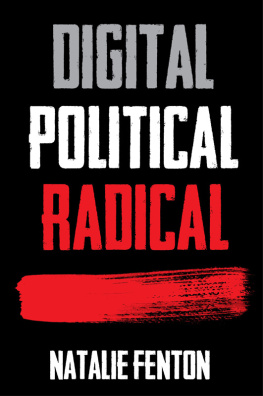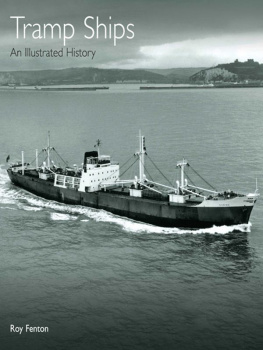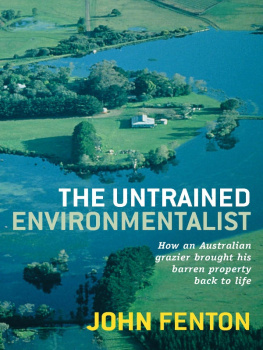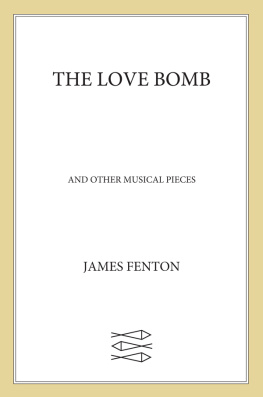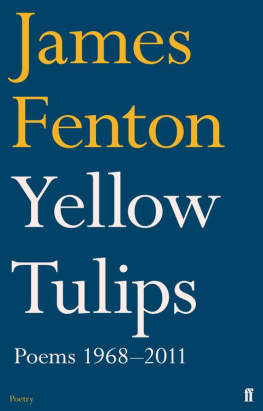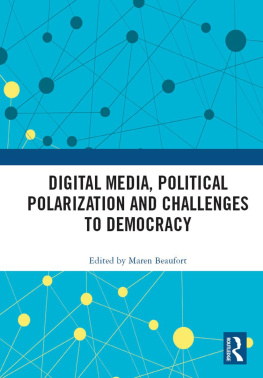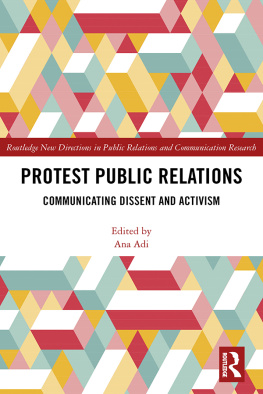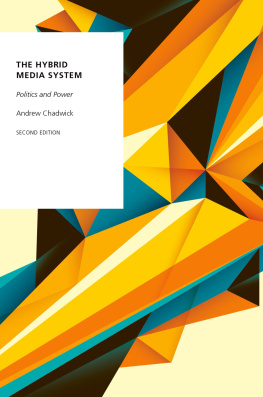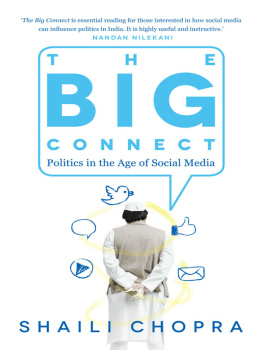
Dedication
For my gorgeous Dad, who would never have read it but would have understood why I wrote it.
Copyright page
Copyright Natalie Fenton 2016
The right of Natalie Fenton to be identified as Author of this Work has been asserted in accordance with the UK Copyright, Designs and Patents Act 1988.
First published in 2016 by Polity Press
Polity Press
65 Bridge Street
Cambridge CB2 1UR, UK
Polity Press
350 Main Street
Malden, MA 02148, USA
All rights reserved. Except for the quotation of short passages for the purpose of criticism and review, no part of this publication may be reproduced, stored in a retrieval system, or transmitted, in any form or by any means, electronic, mechanical, photocopying, recording or otherwise, without the prior permission of the publisher.
ISBN-13: 978-0-7456-5086-9
ISBN-13: 978-0-7456-5087-6 (pb)
A catalogue record for this book is available from the British Library.
Library of Congress Cataloging-in-Publication Data
Names: Fenton, Natalie, author.
Title: Digital, political, radical / Natalie Fenton.
Description: Malden, MA : Polity Press, 2016. | Includes bibliographical references and index.
Identifiers: LCCN 2016005344 (print) | LCCN 2016018009 (ebook) | ISBN 9780745650869 (hardback) | ISBN 9780745650876 (pbk.) | ISBN 9781509511693 (Mobi) | ISBN 9781509511709 (Epub)
Subjects: LCSH: Political participationTechnological innovations. | Communication in politicsTechnological innovations. | Democracy. | Radicalism. | Critical theory.
Classification: LCC JA85 .F46 2016 (print) | LCC JA85 (ebook) | DDC 323/.042dc23 LC record available at https://lccn.loc.gov/2016005344
Typeset in 10.5 on 12 pt Sabon
by Toppan Best-set Premedia Limited
Printed and bound in Great Britain by Clays Ltd, St. Ives PLC
The publisher has used its best endeavours to ensure that the URLs for external websites referred to in this book are correct and active at the time of going to press. However, the publisher has no responsibility for the websites and can make no guarantee that a site will remain live or that the content is or will remain appropriate.
Every effort has been made to trace all copyright holders, but if any have been inadvertently overlooked the publisher will be pleased to include any necessary credits in any subsequent reprint or edition.
For further information on Polity, visit our website:
politybooks.com
Acknowledgements
This book has been made from good conversation, a lot of politics and the best of friendships. During its gestation I was co-head of the Department of Media and Communications at Goldsmiths, University of London; working in two campaign groups for media reform (Hacked Off and the Media Reform Coalition work that is ongoing); engaged in long-standing negotiations on behalf of my trade union; and suffered the death of my dear Dad. Fittingly, maybe, it has been a political journey as well as an emotional and an intellectual one. Along the way very many friends have accompanied me and provided sustenance some talking incessantly (they will know who they are), others making me laugh (thank goodness), feeding me (when I forgot), dancing with me (when I needed to forget), crying with me (when it mattered most). Many have carried my baggage as I have laboured through bureaucratic times and administrative overload and directed me down roads that led to new discoveries and fresh adventures reminding me of my original purpose. I am deeply grateful to each and every one of you there are too many to mention individually but you know who you are.
Politics always brings passions to the fore, and for those who share this passion it is a constant delight to indulge in their company. I have benefited hugely from sharing these passions and sharpening my arguments with many in seminars, lectures, conferences, cafes, bars and pubs, on beaches, on buses, in swimming pools, rivers and seas; with students on the MA Political Communications, my doctoral students, colleagues, friends, family and a fair few strangers! Some even provided precious feedback on earlier drafts despite the pressures of their own working lives. An extra-special thank you goes to Veronica Barassi, Lisa Blackman, Andrew Calabrese, Jacqui Cheal, James Curran, Mariam Fraser-Motamedi, Deborah Grayson, Dave Hesmondhalgh, Sarah Kember, Ben Levitas, Angela McRobbie, Graham Murdock, Angela Phillips, Joanna Redden, Jorge Saveedra, Justin Schlosberg, Mila Steele, Bev Skeggs, Gavan Titley, Hilary Wainwright and Joanna Zylinska and all of the activists who gave of their time to be interviewed and talk all things political in the course of this research.
The Department of Media and Communications at Goldsmiths is a special place. It is one of the few university departments that exist where transformative politics are actively discussed as a seminal part of what we do. The department has provided the structure, the freedom and the inspiration to get this book written. Amid the ever-increasing pressures constantly to neoliberalize our working practices, it is still a place where ideas can breathe, where creativity is embraced and shared learning is relished. To all of my colleagues I owe an almighty thank you. I cannot imagine a more challenging, more collegiate, or more supportive department or a better place to think, theorize and practise politics. Each and every one of you from faculty to technicians to office staff has enabled me in ways many of you will be completely unaware of such is your generosity, such is my good fortune. A particular and heartfelt mention goes to my two co-heads of department Nick Couldry and Julian Henriques whose encouragement and friendship not only helped me finish but also made the institutional politics along the way that much more doable.
The research centres of which I am part and the people I work alongside have provided intellectual breathing spaces in which to linger, explore and interrogate ideas and data. As spaces for critical thought (see ) they have energized and enthused me thank you to the many people who have given of their time to contribute to the Centre for Global Media and Democracy (with special thanks to Kate Nash); the Goldsmiths Leverhulme Media Research Centre (with special thanks to James Curran) and the Centre for Feminist Research (with special thanks to Sara Ahmed). Long may they last.
Of course, there are always certain people that you rely upon more heavily than others. Friends whose ability to politically inspire, intellectually challenge, emotionally support and above all, when things get tough, to tell me incredibly bad jokes (in the most inappropriate of places) is truly a gift that I cherish. So to the original goody-two shoes Des Freedman, the poet Gholam Khiabany and Milly-the-seal-Williamson thank you for oh so very much. Life is simply better when you are around.
Finally, to the wonderful Justin, Isaac and Jude the source of all my passions, political and otherwise for enduring all the politics all of the time and understanding why it matters. When all the talk has died down, I am ever more amazed and so very thankful that you simply get it.
Introduction: Sowing the Seeds of Dissent
In 2007 global capitalism cracked. A financial crash exposed the abuses of the banks and financial agencies, which had worked economic systems to their advantage until those systems fractured under the weight of debt they had created. A chink of light shone through that crack. This was the moment when the brutal and aggressive form of deregulated financial capitalism, which, vampire-like, had been sucking the blood from the body politic, saw sunrise and was rendered momentarily blind. And for a brief period the optimists among us thought that this economic crisis was a moment for radical change. Nine years on, the increased power of corporations and transnational financial agencies over public priorities continues unabated. The glorious promises of liberal democracy continue to morph into the torturous agonies of neoliberalism, where free markets and human freedom are pretty much interchangeable. Inequality has increased. The poor have become ever poorer. The rich continue to prosper. Ecological disaster looms large on the horizon. As the poor get poorer, so they also have less and less influence over policies and politicians and vote less. And democracy is undone.
Next page
